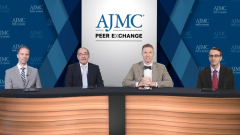
Current Treatments for IgA Nephropathy and the 4-Hit Cascade
Panelists discuss how current immunoglobulin A (IgA) nephropathy treatments primarily target downstream inflammatory pathways of the 4-hit cascade, with emerging therapies now beginning to address specific upstream mechanisms including abnormal IgA1 production, autoantibody formation, and immune complex deposition.
Episodes in this series

Evolution of IgA Nephropathy Treatments: From Downstream to Upstream Targeting
Current Treatment Paradigm
Current standard therapies for IgA nephropathy (IgAN) predominantly target downstream inflammatory processes (fourth hit) of the 4-hit cascade:
- Renin-angiotensin-aldosterone system inhibitors: Reduce intraglomerular pressure and mitigate inflammatory responses in mesangial cells after immune complex deposition
- Corticosteroids: Broadly suppress inflammatory cascades and immune cell activation
- Conventional immunosuppressants: Attenuate effector immune responses and inflammatory damage
These approaches address disease consequences rather than underlying pathogenic mechanisms, explaining their limited efficacy in many patients.
Emerging Therapeutic Landscape
Novel therapies are now being developed to target specific upstream mechanisms in the 4-hit cascade:
First Hit (Aberrant IgA1 Production)
- APRIL inhibitors: Reduce production of galactose-deficient IgA1 (Gd-IgA1) by targeting B-cell stimulation
- Budesonide: Targeted enteric release formulation acts on mucosal-associated lymphoid tissue to decrease Gd-IgA1 production
- B-cell depletion strategies: Reduce IgA1-producing B-cell populations
Second Hit (Anti-Glycan Antibody Formation)
- Selective immunomodulators: Target autoantibody-producing B-cell clones
- Costimulation blockers: Disrupt T-B cell interactions required for autoantibody formation
Third Hit (Immune Complex Formation)
- Soluble FcαR antagonists: Block binding of IgA immune complexes to receptors
- Proteoglycan-targeted therapies: Interfere with immune complex formation and mesangial deposition
Fourth Hit (Inflammation and Fibrosis)
- Complement inhibitors: Target alternative complement pathway activation
- Antifibrotic agents: Address progressive kidney scarring
- SGLT2 inhibitors: Reduce glomerular hyperfiltration and inflammatory signaling
This evolution toward mechanism-based therapies represents a paradigm shift in IgAN management, potentially offering more effective disease modification with fewer systemic immunosuppressive effects. The ideal future approach may involve combination therapies targeting multiple points in the pathogenic cascade simultaneously.
Newsletter
Stay ahead of policy, cost, and value—subscribe to AJMC for expert insights at the intersection of clinical care and health economics.











